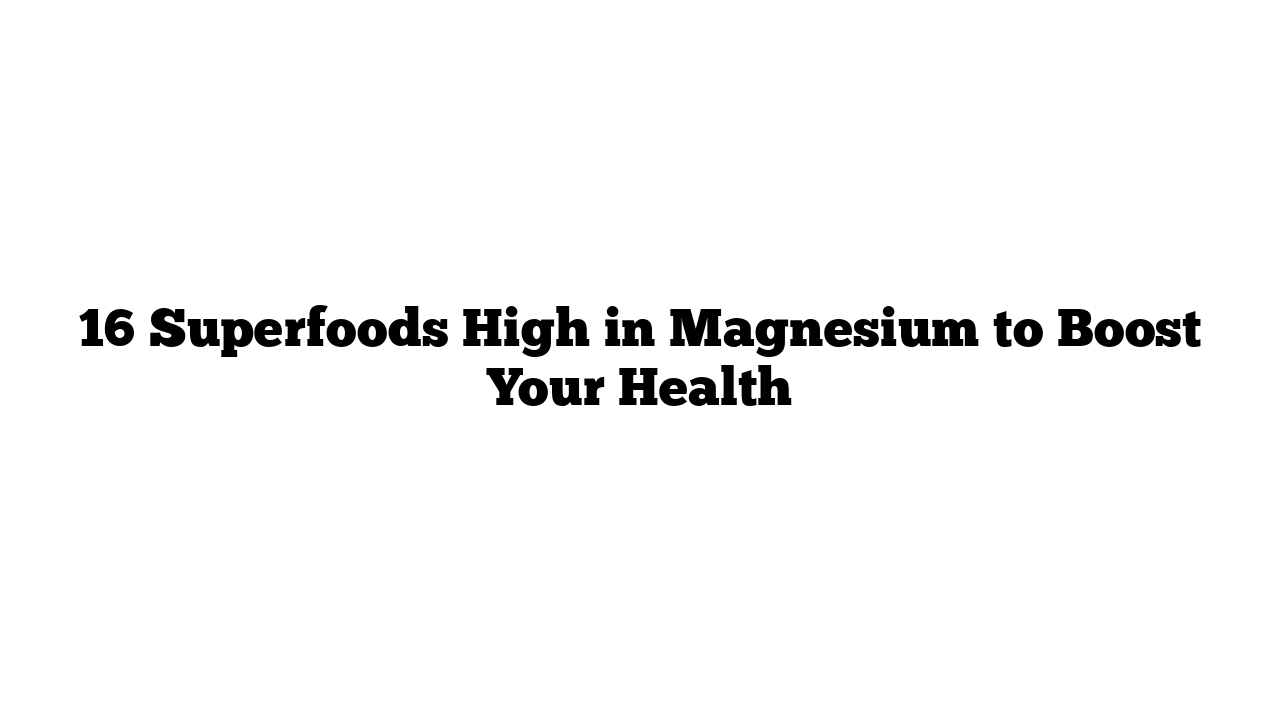Magnesium is a vital mineral that plays an essential role in maintaining our body’s overall health. Despite its importance, many people in the USA and worldwide don’t get enough magnesium in their diets. This can lead to fatigue, stress, and even serious health issues like heart disease or migraines.
In this article, we’ll explore 16 magnesium-rich superfoods, their benefits, and why incorporating them into your diet is one of the best decisions you can make.
Why Is Magnesium So Important?
Magnesium is the fourth most abundant mineral in the human body, essential for over 300 biochemical reactions. From supporting bone health to regulating muscle and nerve function, magnesium is a powerhouse nutrient.
Research even highlights that mitochondria—the energy producers in our cells—depend heavily on magnesium to generate energy, known as adenosine triphosphate (ATP). Without adequate magnesium, your body struggles to function optimally, affecting everything from athletic performance to mental well-being.
Health Problems Linked to Magnesium Deficiency
A lack of magnesium can lead to:
- Migraine headaches
- Anxiety and depression
- Muscle cramps (like Charlie horses)
- Cardiovascular diseases
- Fatigue and weakness
According to studies, 50-80% of Americans may be magnesium-deficient due to diets rich in processed foods, chronic stress, alcohol consumption, and medication use.
How Much Magnesium Do You Need?
The recommended daily allowance (RDA) for magnesium is between 310–420 mg for adults, depending on factors like age and gender. However, the average American diet often falls short, providing only about 150–200 mg per day.
While supplements can help, prioritizing magnesium-rich foods is a healthier, more natural way to meet your needs.
16 Foods Packed with Magnesium
1. Spinach
Spinach is a dark leafy green that’s a nutritional powerhouse. It provides 40% of your daily magnesium requirement, lowers blood pressure, and strengthens bones.
2. Beans and Lentils
These versatile legumes are low in fat and cholesterol but rich in magnesium, promoting heart health and stable blood sugar levels.
3. Edamame
Great for women, edamame’s magnesium content can reduce PMS symptoms, prevent migraines, and regulate blood pressure.
4. Cauliflower
This cruciferous veggie helps the parathyroid gland produce hormones needed for strong bones.
5. Potatoes
Loved in American households, potatoes are rich in both magnesium and potassium, offering protection against rheumatism.
6. Avocados
This creamy fruit is a magnesium superstar, improving heart health, lowering cholesterol, and providing essential vitamins.
7. Bananas
Bananas not only boost white blood cell production but also help with weight management and reducing swelling.
8. Passion Fruit
This tropical fruit improves digestion, boosts immunity, and strengthens bones with its magnesium content.
9. Pineapple
One cup of pineapple juice meets 73% of your daily magnesium needs while strengthening bones.
10. Coconut
Fresh coconut is a great source of magnesium, maintaining electrolyte balance and combating fatigue.
11. Mixed Nuts and Seeds
Half a cup of pumpkin seeds can meet your entire daily magnesium requirement. Nuts like almonds are also great magnesium sources.
12. Dark Chocolate
A single square of dark chocolate can give you 24% of your magnesium needs. Its antioxidants also support heart health.
13. Whole Grains
Packed with magnesium and selenium, whole grains support bone strength and reduce the risk of heart disease.
14. Almonds
Rich in magnesium, fiber, and healthy fats, almonds lower blood sugar levels, cholesterol, and blood pressure.
15. Non-Fat Yogurt (Greek Yogurt)
A calcium and magnesium-rich food that strengthens bones and supports overall health.
16. Tofu
Low in cholesterol and high in magnesium, tofu contains oxalates, which help prevent kidney stones.
Magnesium and Your Heart
More than 300 enzymes in the body depend on magnesium to function properly. For example, magnesium is critical for:
- Relaxing blood vessels to lower blood pressure
- Building strong bones and teeth
- Supporting heart and nerve function
If you’re aiming to prevent heart attacks, ensure your magnesium levels are optimal through a balanced diet.
Practical Tips for Incorporating Magnesium-Rich Foods
- Add spinach or kale to your smoothies or salads.
- Snack on almonds, pumpkin seeds, or a square of dark chocolate.
- Swap processed snacks with edamame or roasted chickpeas.
- Include tofu or lentils in your weekly meal rotation.
Final Thoughts
Magnesium is vital for good health, affecting everything from energy levels to heart health. Incorporating magnesium-rich foods into your diet is a delicious and effective way to avoid deficiencies and support your body.
Want to learn more about health and wellness? Visit medicaltimes.io for trusted articles and tips.
Frequently Asked Questions (FAQs)
1. What are the signs of magnesium deficiency?
Fatigue, muscle cramps, migraines, and irregular heartbeats can indicate magnesium deficiency.
2. Can I get enough magnesium through food alone?
Yes, but with processed foods being prevalent, supplements may help fill gaps.
3. Are bananas a good source of magnesium?
Yes, bananas are a convenient source of magnesium and other vital nutrients.
4. How much magnesium do I need daily?
Adults need 310–420 mg daily, depending on age and gender.
5. Can magnesium help with anxiety?
Yes, magnesium has been shown to reduce anxiety and improve mood.
6. What’s the best time to take magnesium supplements?
Taking magnesium with a meal improves absorption and reduces stomach upset.
7. Is dark chocolate healthy?
Yes, dark chocolate is rich in magnesium and antioxidants, supporting heart health.
8. Can magnesium prevent migraines?
Magnesium helps relax blood vessels, reducing the frequency of migraines.
9. Are processed foods low in magnesium?
Yes, processed foods often lack essential nutrients, including magnesium.
10. Is spinach the best source of magnesium?
Spinach is one of the top sources but can be complemented with nuts, seeds, and whole grains.
